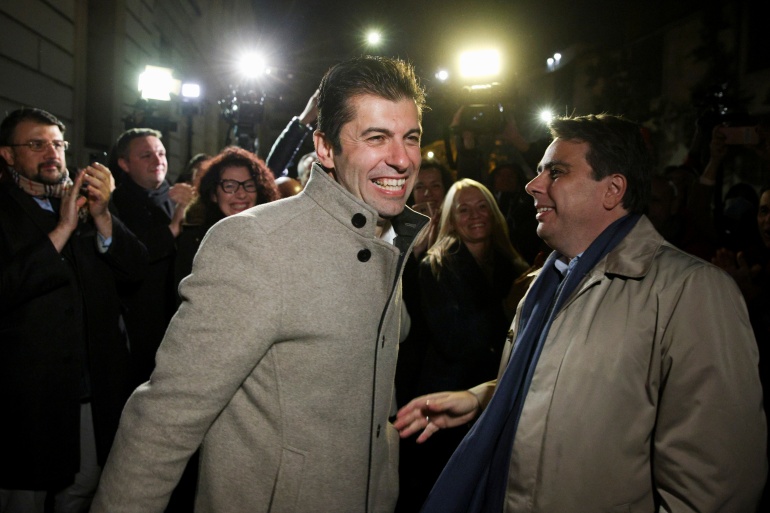By Teodora Yovcheva (University of Sofia)
On Sunday 14th November, Bulgarians went to the polling stations for the third time in eight months. This was the result of two elections, after which the political forces could not agree on government formation. The April election was the first regular one since 2009. The then incumbent ruling party GERB formed an electoral alliance with SDS – winning the elections. Another two newly formed political parties entered the parliament – There is such people (ITN), a party established by the popular TV host and pop-folk singer Slavi Trifonov, and Stand up! Mafia out!, a protest formation, established around Maya Manolova, former ombudsman. The fragmented parliament failed to form a majority and another election was scheduled for 11th of July. As it was expected, they didn’t change much. The same parties and coalitions entered the parliament. The only difference was that ITN won the election with 0.57% ahead of GERB-SDS. Again, the parties were unwilling to compromise and the government was not formed.
The third election on 14th November surprised political and sociological scientist as the newly formed electoral alliance We continue the change (PP) won the election. The alliance is led by two former ministers of the care-taker government – Kiril Petkov and Asen Vasilev. Their extraordinary popularity, brought them electoral gains, as most probably Petkov would be the next prime-minister of Bulgaria.
Another expectation from sociologists – did not come true. The assumption was that the turnout would be higher, because this time the country was electing MP’s and the president of the republic. Instead, turnout was at a record low. Apparently, even the presence of a new formation with popular leaders did not stimulate Bulgarians to go to the polling stations.
What’s different now?
Again, no party has a majority. This time the parliament is even more fragmented as 7 parties and coalitions entered the National Assembly. Bulgarian parliament hasn’t been that fragmented since 2005. Beside that the anti-establishment party “Revival” passed the election threshold of 4%. As Bulgaria ranks as the second-most polarized party system in post-communist Europe the success of “Revival” is a sign that even higher polarization could be expected.
The electoral decline of several formations led to the resignation of their leaders. The leaders of parties in the electoral alliance of Democratic Bulgaria resigned on the next days of the elections. The head of the Bulgarian Socialist Party also decided to make that step. The resignations after electoral defeat are not unusual, but now they concern the key partners of PP which could impact the future coalition. The alliance lost most of its votes at the expense of the new player – PP. One of the leaders of DB hints that the alliance has exhausted its coalition agreement and it’s future remains to be decided. All of this signals for the potential upcoming instability.
Future government, but how long?
A coalition seems to be the only option as a minority government is not even discussed by the winners. Although PP is a new formation, it has adopted a quite different discourse compared to the populist one of ITN in July. ITN firstly refused cooperation with the other parties, then made a step back and started negotiations, which did not result in the formation of a government. The electoral decline of ITN can be seen as a warning sign of what happens when you unnecessarily make the voters go to the polls.
It seems that PP have learned that lesson, because the day after the election they declared that unofficial negotiations have started with the Bulgarian Socialist Party, Democratic Bulgaria and ITN. All of the potential partners tend to agree on a coalition. If it takes place, Bulgaria will be governed by a four-party coalition for the first time in its democratic history. The prospect coalition would be very heterogenous including populist party (ITN), the Bulgarian Socialist Party, personalized formation (PP) and electoral alliance between greens and conservatives. The winners are enthusiastic to govern, but we can hardly expect the full term since the coalition is so diverse. The Covid and economic crisis would make the task for full term government even more difficult.
What did this election show us?
The win of a new political formation is not happening for the first time in Bulgaria. In 2001 National Movement Simeon the Second was created only two months before the elections and won it. In 2009 Boyko Borissov and his GERB succeeded to win elections relying mostly on the charisma of Borissov. July’s election in 2021 was won by There is Such People, a party established in 2020. November’s election was a triumph for We continue the change, formed two months earlier.
The win of newly formed parties and coalitions signals that Bulgarian electoral market is rather open. Unlike Western-European societies it is not restrained by deeply rooted parties. All of the above-mentioned formations relied mostly in the charisma of their leaders. It could be concluded that personalities have major impact when Bulgarians cast their ballots. The elections often turn out to be a way for a choice of new popular leader.
Photo source: https://www.aljazeera.com/news/2021/11/14/exit-polls-suggest-tight-race-in-bulgaria-presidential-election


